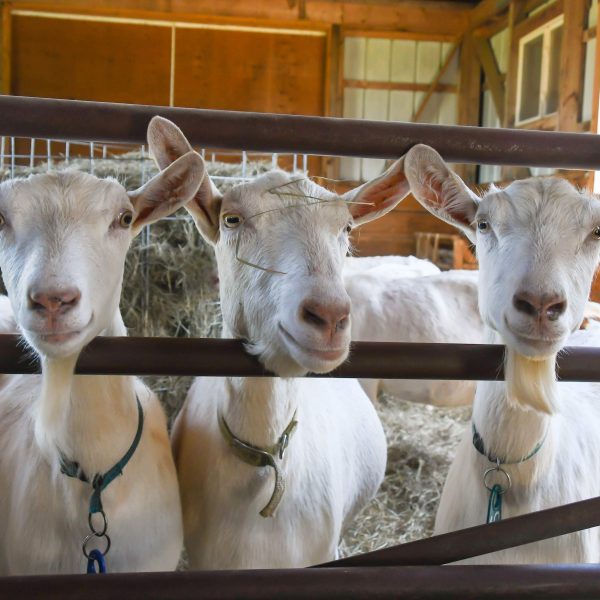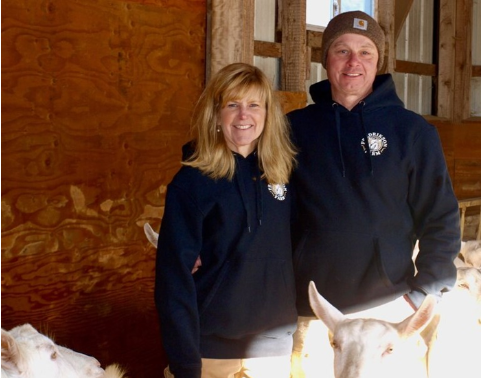
By Katie Spring, Outreach & Content Specialist at NE-DBIC
The Northeast Dairy Business Innovation Center (NE-DBIC), hosted at the Vermont Agency of Agriculture, Food & Markets, provides support to dairy businesses through projects that promote the development, production, marketing, and distribution of dairy products.
Ed and Dianna Fredrikson have come a long way from dabbling in cheese making while supporting their daughters in raising goats for 4-H.
What started out as a hobby for their girls grew into Fredrikson Farm: a goat dairy in China, Maine, producing chevre and aged cheese that’s now sold throughout New England. Over the last 12 years, Ed and Dianna have built their farm into a profitable endeavor, in part thanks to the skills they bring from previous careers, along with a good dose of sweat equity and an obvious love for their goats.

“We’ve had a lot of success and exposure. We’re selling out of cheese every year, and we keep making more and keep selling out,” Ed said.
The demand for their cheese led them to apply for a Dairy Food Safety & Certification Grant with the Northeast Dairy Business Innovation Center (NE-DBIC), which allowed the Fredriksons to purchase a new closed batch pasteurizer that will accommodate increased milk production. Along with the new equipment, the grant also paid for Dianna to become a certified Preventive Controls Qualified Individual (PCQI) through the Food Safety Preventative Controls Alliance. Prior to the PCQI training, the Fredriksons had to hire an independent inspector to certify their food safety program ahead of 3rd party audits required by one of their wholesale accounts. Now, Dianna can do the work of the inspector.
“Getting the certification has been very beneficial,” Dianna said. “Now I know how to develop the processes we have to add to our food safety program. I can write the procedures and feel confident about any changes we make.”
With a strict adherence to food safety standards, the new 1000 liter pasteurizer not only means they’ll be able to increase their milk capacity, but they’ll also continue to meet PMO (Pasteurized Milk Ordinance) guidelines that ensures the freshness and safety of their products.
“This grant is going to double our capacity. It’s a big deal,” Ed said. “We had the market for our product, and we can in turn absolutely benefit from it.”
Dianna agreed, adding, “Without the help of this grant, we wouldn’t have financially been able to take that step or boost our volume. We would’ve been stuck at this point.”
Come springtime, Ed and Dianna will be milking nearly 80 goats, an increase of about 30 does from their previous years. In the meantime, Ed is busy installing the new pasteurizer during the winter when they take a break from milking. “The great thing about drying off is it gives us time to execute these projects,” he said. “Once we start kidding season, there’s no time.”
Their cheese sales don’t take winters off, though. In fact, sales have been increasing thanks to recognition they’re receiving on many fronts, including a highlight on season 3, episode 3 of the Magnolia Network show The Lost Kitchen.
With the installation of their new pasteurizer and the efficiencies created by their food safety certification, the Fredriksons are looking forward to expanding their production and wholesale accounts.
Photo courtesy of Fredrikson Farm
Are you a dairy farmer or processor looking for funding to improve your food safety and expand market access? Learn more about the Dairy Food Safety & Certification Grant on our website, or reach out to grant coordinator Brockton Corbett.
